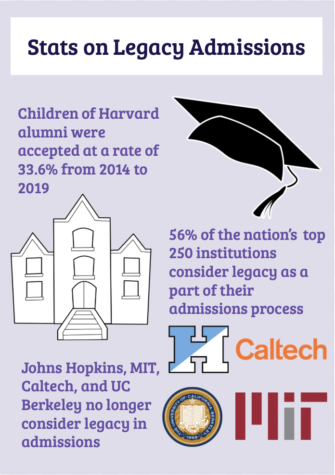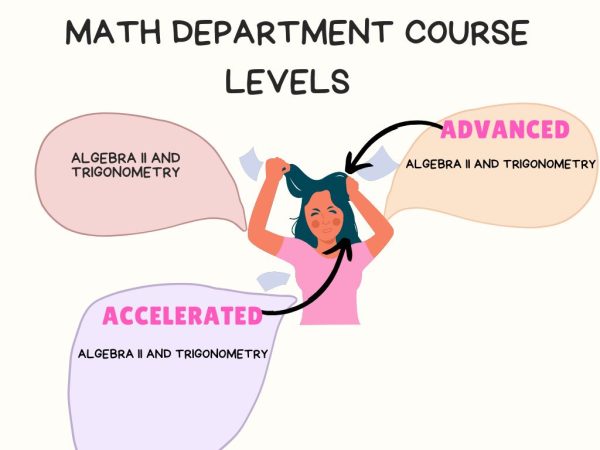Opinion: Tips From A Senior — Preparing for College Applications
Credit: Rebecca Ingles
As a senior in high school who has completed the college application process, I wanted to share my tips, tricks, and thoughts on the process. Wherever you are along the process, I hope this article brings you some degree of comfort and security. All the advice mentioned below is based on my personal experience and what has worked for me, however, the college application process is different for everyone and these tips may not apply equally.
Freshman year:
Welcome to high school! Along with new changes come new pressures, namely college. Though it may feel like you’re running out of time, as a freshman, you have all the time in the world.
The most important thing to do during freshman year in terms of college prospects is to calm down and self-reflect. While you still have plenty of time before committing yourself to any one major, it’s helpful to start thinking about what you enjoy. What academic field is the most fulfilling to you? What extracurriculars bring you the most joy? Again, your middle school experience does not dictate your future in high school. As a freshman still relishing in my own victory of the eighth-grade history award, I was confident in my future trajectory as a devout student of the humanities. After applying to the Independent Science Research Program I found myself heading down a starkly different path of STEM courses. Now as a senior, I take three science classes and am planning on majoring in environmental science in college.
Freshman year carries lower stakes and is a perfect time for self-discovery. Your academics, hopefully, aren’t too hard yet and you’ll probably find yourself with spare time. Try new things! Join a sport, try Hudson Scholars, take a minor that intrigues you. You shouldn’t feel married to hobbies you may already have that no longer bring you joy. High school is a time of new beginnings and it’s never too late to try new things despite how it may seem. I started running cross country and track as a senior for the first time and loved it, which shows it’s never too late to start.
Sophomore year:
While the transition from freshman year to sophomore year certainly brings a higher level of stress and challenges, it does not signal the end of all days. You are still an underclassman, albeit an older one, and can take comfort in knowing you are not in the thick of things yet.
However, there are certain considerations and responsibilities that come with 10th grade. As a freshman, your courses were mainly picked out for you, but as a sophomore, you have more freedom in deciding your academic pursuits. Begin thinking about your long-term academic plan and consider drafting a preliminary future course plan. Review the Hackley graduation requirements and the course offering guide to create a tentative future plan that balances the essentials and enjoyment. As a sophomore, I knew I wanted to take AP biology and Advanced Forest Ecology Research, but also had major commitments to the Dial and IRP. By starting my three-year academic plan early, I had ample time to reorganize and structure my class progression to include everything I wanted to take.
Additionally, you should reflect on all the hobbies and interests that you have been exploring. Decide which ones make you the happiest and commit to them. It’s much better to pursue a couple of extracurriculars that you thoroughly enjoy rather than a million that you aren’t particularly excited about. I remember going to the club fair and signing up for dozens of clubs that sounded interesting to me, and never attending each more than once. Eventually, I became especially involved in the Pollinator’s Club and was able to devote my full attention to this club rather than spreading it thinly across many.
When picking activities to pursue, it’s essential to prioritize your own enjoyment first. You might feel obligated to pursue hobbies that are “better for college,” but it’s much better to do something you are passionate about instead of something you only tolerate. Colleges will pick up on this passion and find it impressive. Begin looking for leadership opportunities in the extracurriculars you enjoy and apply for positions for the upcoming year. During my sophomore year, I began applying for leadership positions in the activities I was involved with to show my devotion and responsibility. For example, I applied to be an editor on the Dial for the upcoming school year.
Lastly, take both the pre-ACT and pre-SAT that Hackley offers later in the year. You may feel partial to one test or the other for whatever reason, but it’s important to try both out and see which is actually best for you.
Junior year:
Junior year is here and the end feels near. Don’t panic! While I can’t lie to you and say junior year will be a walk in the park, it is definitely manageable with the right approach and mindset
Aim to take whichever standardized test you chose as soon as possible. The sooner you start the more time you will have to study and increase your score if needed. I got a late start to taking the ACT and ended up rushing to improve my score at the start of senior year when I was busy with a thousand other responsibilities. In the end, I never reached the score I was aiming for due to this late start and opted to go test optional.
Standardized tests are not the be all and end all. Most colleges are now test optional after the COVID pandemic and there is no pressure to submit. Of course, if you have a competitive score it certainly helps to submit it, but there is no penalty for withholding it.
Work on cementing the extracurricular activities that you chose in sophomore year to pursue further. Try to achieve leadership or other higher positions in these activities to demonstrate your involvement. Whether that looks like being a captain on a sports team, member of student council, or a leader of a club, it’s vital to show growth and progression in your extracurriculars. Again, don’t spread yourself too thin. Pick a few that you really love and focus your efforts on those. It’s much better to become very involved and experienced in two activities than barely active in ten different things.
Begin to create your college list. Think about what qualities in a community and learning environment are most important to you. Do you like being surrounded by lots of people or a few? Are you more invested in the arts or in sports? While these types of questions are just the tip of the iceberg regarding considerations when making a college list, they’re certainly a good place to start. College board offers a helpful service called College Search where you can enter your preferences for a school and it will generate a list for you. Remember, your college list is uniquely your own; not your parents’, nor your siblings’, nor your counselor’s. Prioritize what you want in a school first.
Look into demonstrated interest and how you can best exemplify it. Some colleges, though not all, track your interest and consider it when deciding whether an applicant should be admitted or not. Even if they do not track it, it will prove useful for you to genuinely seek information about the schools you are pursuing. Colleges track interest through a multitude of ways such as whether you open their emails, sign up for any info sessions, meet with admissions representatives who come to visit Hackley, as well as campus visits. For any acts of demonstrated interest that will take more planning such as a campus visit, try to schedule those in advance as they book up fairly quickly. Consider taking a road trip to a nearby school on a long weekend; visiting a school can show you things that a website would never reveal. I remember being torn between two very similar schools for my Early Decision choice. In the end, visiting both schools and exploring the nearby community gave me that “gut instinct” of which one was right for me.
Senior year:
Buckle your seatbelts because things are about to get really tricky really fast. However, by managing your time well and staying organized, senior fall is very doable. The key to a less stressful senior year is getting started early. Ideally, you’ll have begun working on college applications during the summer before senior year. The summer is a perfect opportunity to get work done in a less pressured environment and make things easier for yourself once school starts. Even though you may feel burnt out and need rest over the summer, I promise you will not want to start senior fall off without a good chunk of your work already completed. Working on your applications over the summer will only make your life easier.
First, you should finalize your college list. Aim for no more than 15 schools with a diverse mix of selectivity. Don’t just add schools because you “feel like you should”, even for your safeties. It’s vital for a fulfilling and successful college application process that you actually like your safety schools. In the end, I was accepted into my ED school, but I genuinely loved all my safety schools and would have been content at any of them if things didn’t work out otherwise.
Once that list is established, begin looking for potential supplementary materials those specific schools might require. Many schools either offer or require an additional supplemental essay on a topic of their choosing. Try to have the majority of those supplemental essays done before school starts – your future self will thank you.
In addition to supplemental essays, all schools require the common app essay. The common app essay is a 650-word essay about a topic of the students choosing, though it’s typically about a challenge one overcame in their life. Many students dread the essay due to its ambiguous and unclear nature; however there is nothing to fear. The essay will not make or break your application, and as long as it’s written well and conveys your character, there’s no need for excess anxiety. I ended up writing both my common app essay and my supplemental essays at a writing camp the summer before senior year started and felt immensely relieved once school started at having this burden over with.
Continue showing a demonstrated interest in schools you want to pursue. Interviews are a great way to show demonstrated interest and to strengthen your profile as an applicant. So much of the college process is virtual and impersonal, so having an opportunity to converse with a representative can be extremely helpful. Interviewing with admissions representatives gave me an opportunity to elaborate on aspects of my personality and skill set that I didn’t have the space to do so on the common app. Essentially, you can learn more about the school while the school learns more about you. After finishing all my interviews, I felt more confident and secure in my strength as a candidate. Additionally, many schools will send an admissions counselor to Hackley in the fall to speak to students. Make sure to attend the info sessions of the schools that are on your list.
It’s vital to stay organized during the application process as there are countless deadlines, assignments, and events to simultaneously remember. Unfortunately, we do not live in a perfect world where every college has the same standardized application deadlines, essays, and processes. As such, each of these variations between schools begins to pile up and can feel overwhelming to stay on top of. Utilizing an organizational system to manage all of your applications is an absolute must. That organizational system may look different for each person, but whether it be a spreadsheet or an app, staying organized is necessary. Personally, I used an application called notion and created a “page” for each college I was applying to include deadlines, links to work, important information, and more.
Finally, give yourself grace. The college application process is an extremely taxing, stressful, and long process. Let go of unrealistic expectations and accept the imperfect. Don’t beat yourself up ceaselessly if a school doesn’t work out. Acceptance decisions are largely arbitrary and don’t reflect your worth as a person, though it might feel that way at the time. I’ll also add that it may feel stressful when your peers begin to receive good news and you may not, but everyone’s journey looks different and whatever path you are meant to go down will find you. Though it’s easier said than done, try to love and accept yourself no matter the outcome.










Rebecca Hall • Feb 16, 2023 at 12:32 pm
Good article, Bella! Glad to see that what we espouse in our College Counseling curriculum is reflected in your guidance. For those who want to learn more, feel free to check out Hackley’s College Counseling Handbook (HOL–>Upper School–>College Counseling)